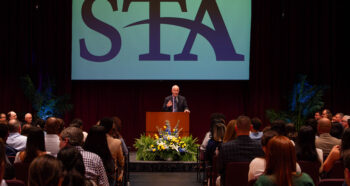As a member of Cambridge International’s US recognition team, much of my work involves advocating with colleges and universities to make sure students get the credit they deserve for completing Cambridge International AS & A Level courses and exams.
And when I talk about ‘credit’, I don’t just mean making sure Cambridge students are recognised for their knowledge and skills. I’m also referring to ‘college credit’ or ‘advanced placement’ – the policies implemented by US higher education to offer students more opportunities for college success. Students who enter US higher education with college credits can shorten the time it takes them to earn a degree and, as a result, save on their tuition costs.
Many state higher education agencies in the US have established system-wide policies for the consistent and equitable award of college credit for students earning qualifying exam grades, while a number of other colleges and universities create their own individual policies to recognise and reward students who complete advanced academics. For students, the variety of policies differing from one institution to the next can make applying to, or transferring between, institutions a confusing process.
Exemplary legislation adopted in Washington state ensures their public college and university systems are consistent and transparent in applying credit and placement policies for advanced academics. This Washington legislation benefits a broad array of students who take college-level courses in high school and successfully pass end-of-course exams.
Since January 2018, the state has ensured that students would be awarded the maximum credit for dual-credit examinations 1 – such as Cambridge International AS & A Levels. The legislation requires state institutions to award as much credit as possible and appropriate for specified scores on Cambridge International AS & A Level, Advanced Placement and International Baccalaureate exams.
Thanks to this forward-thinking legislation, all two- and four-year public higher education institutions in Washington (36 universities and community and technical colleges) are required to establish evidence-based policies for granting appropriate college course credit, post their policies on publicly accessible websites, and undergo biennial reviews. Cambridge students are assured that Washington institutions will recognize their hard work and achievement.
Apply with confidence
Cambridge International AS & A Level exams have long been well known by US admissions officers, who are used to receiving applications from international students holding these qualifications. Cambridge International has also grown steadily in high schools around the US, and an increasing number of US students are applying to college with Cambridge qualifications.
High schools in Washington and beyond can offer rigorous college-level courses from Cambridge International to their students. They can also now be confident that students’ advanced academic achievement will be consistently and equitably rewarded by public higher education in Washington with the same consideration as other nationally and internationally recognised advanced academic programmes.
Washington’s legislation represents a model to advance equity. Their system-wide commitment to fair, consistent, and transparent credit awarding policies fosters opportunities for students, schools, and higher education.
And it’s not just US students who benefit. This policy benefits Cambridge students from around the world who want to study in Washington state too.
More information
Learn about US state and system policies for Cambridge qualifications
Get tips on how to apply for college credit: International students get credit to US universities too
- If a course is categorised as ‘dual credit’ in the US, it means it is college-level standard. Students who take dual-credit courses in high school can begin earning credits towards their college degree, and get a head start on their future studies.





